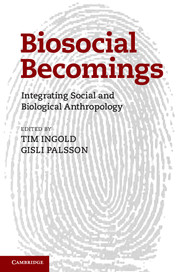Book contents
- Frontmatter
- Contents
- Preface
- 1 Prospect
- 2 Ensembles of biosocial relations
- 3 Blurring the biological and social in human becomings
- 4 Life-in-the-making: epigenesis, biocultural environments and human becomings
- 5 Thalassaemic lives as stories of becoming: mediated biologies and genetic (un)certainties
- 6 Shedding our selves: perspectivism, the bounded subject and the nature–culture divide
- 7 Reflections on a collective brain at work: one week in the working life of an NGO team in urban Morocco
- 8 The habits of water: marginality and the sacralization of non-humans in North-Eastern Ghana
- 9 ‘Bringing wood to life’: lines, flows and materials in a Swazi sawmill
- 10 Humanity and life as the perpetual maintenance of specific efforts: a reappraisal of animism
- 11 Ravelling/unravelling: being-in-the-world and falling-out-of-the-world
- 12 Retrospect
- References
- Notes on the contributors
- Index
8 - The habits of water: marginality and the sacralization of non-humans in North-Eastern Ghana
Published online by Cambridge University Press: 05 June 2014
- Frontmatter
- Contents
- Preface
- 1 Prospect
- 2 Ensembles of biosocial relations
- 3 Blurring the biological and social in human becomings
- 4 Life-in-the-making: epigenesis, biocultural environments and human becomings
- 5 Thalassaemic lives as stories of becoming: mediated biologies and genetic (un)certainties
- 6 Shedding our selves: perspectivism, the bounded subject and the nature–culture divide
- 7 Reflections on a collective brain at work: one week in the working life of an NGO team in urban Morocco
- 8 The habits of water: marginality and the sacralization of non-humans in North-Eastern Ghana
- 9 ‘Bringing wood to life’: lines, flows and materials in a Swazi sawmill
- 10 Humanity and life as the perpetual maintenance of specific efforts: a reappraisal of animism
- 11 Ravelling/unravelling: being-in-the-world and falling-out-of-the-world
- 12 Retrospect
- References
- Notes on the contributors
- Index
Summary
Introduction: self-writing texts
At the end of the nineteenth century, the American writer and naturalist Henry David Thoreau (1906) made some remarks that would resonate with the thinking of both Bronislaw Malinowski and Clifford Geertz. This can be seen by comparing the way Malinowski and Geertz used the term ‘culture’ with the way the word ‘nature’ figures in the works of Thoreau. Like Malinowski, indeed, Thoreau aimed at ‘grasping the native point of view’. His ‘native’, however, did not coincide with the Trobriand islanders of Malinowski or with any other indigenous people, but with nature. He wanted to become so intimately connected to nature that his observations would eventually become introspective (Worster 1994). It is as if he foresaw the experience of a mutual and emotional relationship between observers and observed to which anthropologists aspired during the second half of the twentieth century. Furthermore, Thoreau was worried about how to read ‘nature’s poem’. Nearly one century before Geertz (1973) had proposed his celebrated definition of culture as text, Thoreau (1906) lamented the fact that too many pages of nature’s poem were missing, unreadable or damaged. What Geertz would have seen as a key feature of culture, for Thoreau was evidence of the anthropogenic decay of nature.
Thoreau was looking for a pristine, uncontaminated landscape seen as a text written once and for all, but he could not find it. His quest for a complete version of nature’s poem was the ideal counterpart of the notion of culture as a static, internally homogeneous and balanced whole. Thoreau was thinking of nature’s poem in terms of being. Had he thought in terms of becoming, his frustration would have been groundless. I suggest that the metaphor of the landscape as text, which has probably been overused in recent years, might profitably be relaunched within current environmental anthropology in the framework of complexity. In order to do this it is necessary, first of all, to identify the environment, rather than the landscape, as the metaphorical referent of the ‘text’. Secondly, it would be helpful to focus attention not only on the process of reading, but also on that of writing. Thirdly, we should abandon the common notion of text as a written verbal trace and think of it, instead, as the result of elaboration and diffusion by several different users of an open-source software.
- Type
- Chapter
- Information
- Biosocial BecomingsIntegrating Social and Biological Anthropology, pp. 145 - 161Publisher: Cambridge University PressPrint publication year: 2013
- 2
- Cited by



